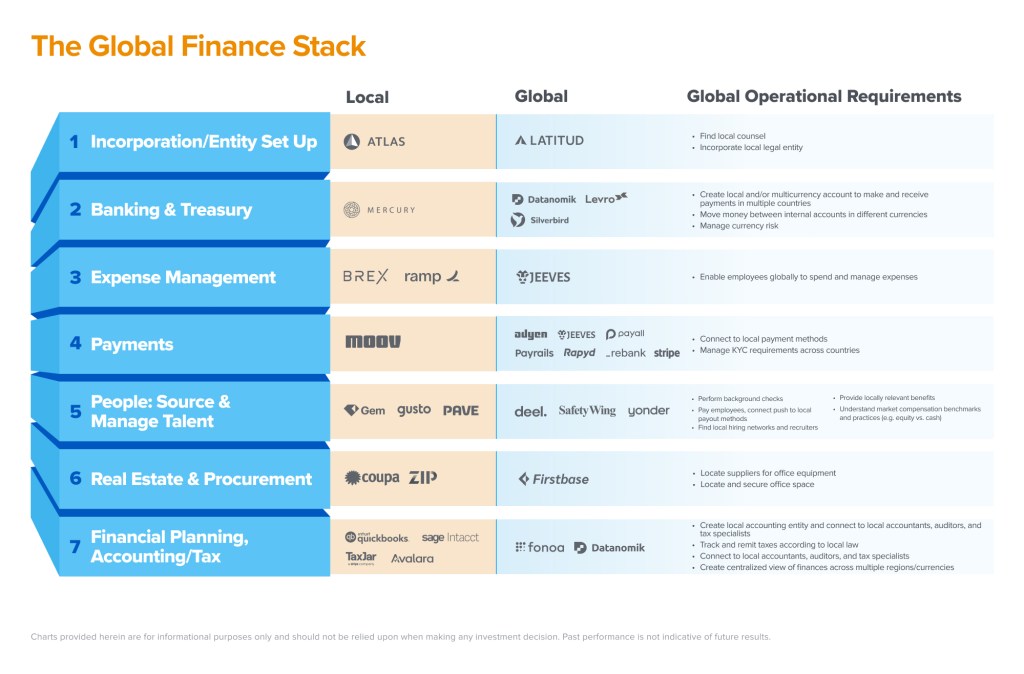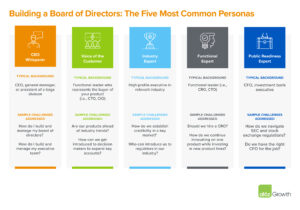As the successful businesses of tomorrow launch in multiple countries at a time, opportunities abound for ambitious startups looking to build the internal software systems these companies will need to grow.
For decades, startups largely followed a well-trodden playbook for how to start and scale a company. First, pick an HQ city (usually where the founding team lives) and then hire your first 50-100 employees and (mostly) serve customers in that area. After two to three years, open a second office after talent becomes harder to hire, or you need local sales support to serve customers in another geography. Rinse and repeat until you have several offices around the world and have effectively gone “global.”
While not obsolete, this model is being supplanted by a new and emerging model that is global from day one. Thanks in part to the remote-only experiments that Covid forced so many to run, new companies are no longer tethered to the hometown of the founder, nor limited to hiring local talent. The first 50-100 employees may span several countries, let alone cities and states.
TABLE OF CONTENTS
The default global impact
The arrival of these new default global companies brings new challenges. For example, software that supports external functions like marketing and sales for non-HQ locations are well developed. Tools like Marketo and Salesforce respectively allow companies to send customized marketing emails by local language, and to support sales in multiple geographies. However, for human resources, finance, and other internal systems, software hasn’t historically existed to effectively onboard, pay, and provide benefits to employees in multiple countries, nor support expense reporting, banking accounts, and treasury management.
Herein lie the opportunities. The software stack for a default global company’s functions needs to be international from the start in order to better integrate everything from local employment law and talent sourcing to multi-country incorporation and expense management.
So even if It may seem like the tech story of the global workforce has already been told (Zoom! Slack! etc.), the reality is, most of the companies that will be needed to support these new “default global” companies have yet to be built. Below, we discuss some of the opportunities we see:
TABLE OF CONTENTS
What’s next?
Much opportunity exists to build software, especially for the HR and finance teams that set companies up for their default global success. However, it’s the second-order implications of this shift that are perhaps even more impactful.
As more companies hire early employees in more countries, a more globally diverse set of executives will emerge. These execs will have helped companies scale from 0 -> n, making many of them likely to become future founders—except now, these would-be CEOs won’t be starting companies in the commerce centers of the last century (London, NYC, Tokyo, etc.). Instead, they’ll be able to start and grow their companies from anywhere in the world, be it coastal Portugal or rural Montana. Talent is global, and opportunity will soon become more global too. It all begins, though, with a modern software stack that supports the next generation of default global companies.
***
The views expressed here are those of the individual AH Capital Management, L.L.C. (“a16z”) personnel quoted and are not the views of a16z or its affiliates. Certain information contained in here has been obtained from third-party sources, including from portfolio companies of funds managed by a16z. While taken from sources believed to be reliable, a16z has not independently verified such information and makes no representations about the enduring accuracy of the information or its appropriateness for a given situation. In addition, this content may include third-party advertisements; a16z has not reviewed such advertisements and does not endorse any advertising content contained therein.
This content is provided for informational purposes only, and should not be relied upon as legal, business, investment, or tax advice. You should consult your own advisers as to those matters. References to any securities or digital assets are for illustrative purposes only, and do not constitute an investment recommendation or offer to provide investment advisory services. Furthermore, this content is not directed at nor intended for use by any investors or prospective investors, and may not under any circumstances be relied upon when making a decision to invest in any fund managed by a16z. (An offering to invest in an a16z fund will be made only by the private placement memorandum, subscription agreement, and other relevant documentation of any such fund and should be read in their entirety.) Any investments or portfolio companies mentioned, referred to, or described are not representative of all investments in vehicles managed by a16z, and there can be no assurance that the investments will be profitable or that other investments made in the future will have similar characteristics or results. A list of investments made by funds managed by Andreessen Horowitz (excluding investments for which the issuer has not provided permission for a16z to disclose publicly as well as unannounced investments in publicly traded digital assets) is available at https://a16z.com/investments/.
Charts and graphs provided within are for informational purposes solely and should not be relied upon when making any investment decision. Past performance is not indicative of future results. The content speaks only as of the date indicated. Any projections, estimates, forecasts, targets, prospects, and/or opinions expressed in these materials are subject to change without notice and may differ or be contrary to opinions expressed by others. Please see https://a16z.com/disclosures for additional important information.
- Andreessen Horowitz
- Bitcoin
- blockchain
- blockchain compliance
- blockchain conference
- coinbase
- coingenius
- Consensus
- crypto conference
- crypto mining
- cryptocurrency
- decentralized
- DeFi
- Digital Assets
- ethereum
- financial services
- fintech
- machine learning
- non fungible token
- plato
- plato ai
- Plato Data Intelligence
- Platoblockchain
- PlatoData
- platogaming
- Polygon
- proof of stake
- tech is global
- W3
- zephyrnet












